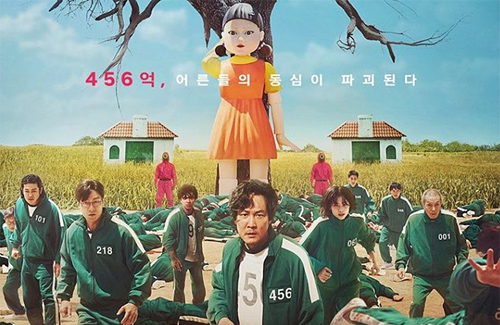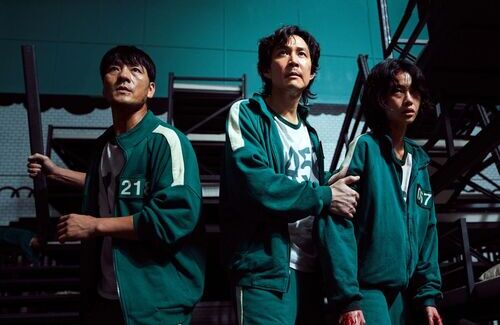“Squid Game” Marks a Turning Point for Korean Dramas

Released on September 17, Squid Game has become the most popular Korean drama at the moment. Starring Lee Jung Jae and Park Hae Soo, the horror thriller revolves around a group of financially desperate people playing a high-stakes survival game with a deadly twist. Topping the charts by trending number one on Netflix globally and in the United States, Squid Game has become an international sensation.
In the past, Korean dramas were known for their tear-jerking idol romances which appealed largely to female viewers. Since Netflix has started investing in Korean dramas, content has been diversified into different genres from horror to science fiction to crime, which dismantled the former perceptions against Korean dramas as being only romance fare.
Squid Game is not the first horror-thriller drama to gain international attention, as Kingdom, which was filmed two years ago, also received great feedback. Following that success, Netflix invested in a variety of diverse dramas including Extracurricular, The School Nurse Files, Sweet Home, and D.P.
Many viewers feel that current Korean dramas have matured since Netflix’s backing. Many have expressed their happiness in this new change: “You can’t watch these shows without Netflix”; “I’m glad that they aren’t all sappy romances anymore”; “Netflix has included a lot more experimental dramas” and “This is the result of creativity and budget.”
As Korean television stations primarily focus on ratings and returns, it is reasonable as to why they are unwilling to invest in experimental scripts that do not follow past successes. With Netflix’s financial resources, a wider variety of dramas can now be produced and allow the industry to break new ground.
Source: HK01
This article is written by Hailey for JayneStars.com.








Actually, Japan produces such genre even better or even longer but it is a shame they have not been actively globalizing their Entertainment industry… From Music to Films to Dramas, they seem to have just focus on their own local market. It is definitely not due to lack of talents or creativity, it is their own choice. .. Where else SK had the chance to dominate the international industry last few years…
I feel it is a huge shame and personally I do not understand why.
Jpop and Jdorama used to be big in Asia during the 90s and early 2000s. Masaharu Fukuyama, Yutaka Takenouchi, Noriko Sakai, Nanako Matsushima and of course, Takuya Kimura were well-known outside Japan with their dramas. There were also singers like Utada Hikaru, Ayumi Hamasaki, Namie Amuro, Smap, Arashi, Chage and Aska to name a few. Before them, J-entertainment were already growing in other parts of Asia with Momoe Yamaguchi, Anzen Chitai, etc. Yet somehow, J-entertainment lost its glam after that.
I don’t watch Jdrama that often now, one reason is subs can be harder to find and there seems to have a good portion of manga adapted teens drama where high school students fall in love and I have outgrown these storylines (just like Cdrama saturated with recycled plot of love stories between the young male and female leads who cannot act). I may even consider sitting through the Japanese Taiga dorama if I can find them with subs. I don’t recall seeing many family drama among the Japanese production, unlike the SK, which can be really popular among the older generation outside SK though when it comes to plot creativity, the Japanese can really do good and interesting but short drama.
Japanese samurai films of Akira Kurosawa were the first to break into international exposure during the olden days of the 1960s. Kurosawa was honored in Hollywood and Europe, although his films were not as popular domestically.
Subs are not that hard to find but you will have to d/l them. I have been watching Jdorama for 2 decades.
i agree w/ you. japanese drama are indeed quite good with refreshing ideas. many of the show that tvb produced were and still copied their ideas from jdrama. true that most stories come from anime but i wouldn’t say that all are romance based. there are many shows where gambling and wit are the main elements. those shows, i have yet to see in dramas from other countries. i find that the japanese are especially good at writing stories that involving the use of one’s wit to win, like detective, horror, and thrillers shows. jdrama indeed one of a kind that i have yet to see in other countries productions.
once in a while hollywood would pop out something good but those have been getting rare and rare. all western shows seem to be the same to me with the storytelling,, filming and ideas. i guess that is why they are starting to look at the east for ideas.
This is a great example of shifting your focus when something no longer works. S.Korea’s local channels are suffering because they have to appeal to their local audiences. Netflix actually gave them a platform to expand beyond that w/out relaying so heavily on local ads to make their budget. So while China continue to expand and stay on the path of repetitive idol/romance drama & working around their government’s restriction, K-drama/movies are moving away from it.
Which also makes me wonder how China’s production companies able to make make $? They pay their actors alot and the value of their production value are far and even beyond USA’s own dramas. Many dramas are shelved & are shown only online platform. I hope they continue to make better choices, because they have so much potential & to give better contents then the same old story lines we are seeing. I subscribed to iQIYI and Tencent (when there are specials holiday Sales) & so far through the whole year, I only finished 2 dramas from beginning to end.
good, can’t stand those superfluous excessive exhibition of love stories. very true, the squid game and kingdom are rarities in k drama w/o any romance as its main/subplot. sweet home is also another one but the story with that one was somehow too bland and slow pace.